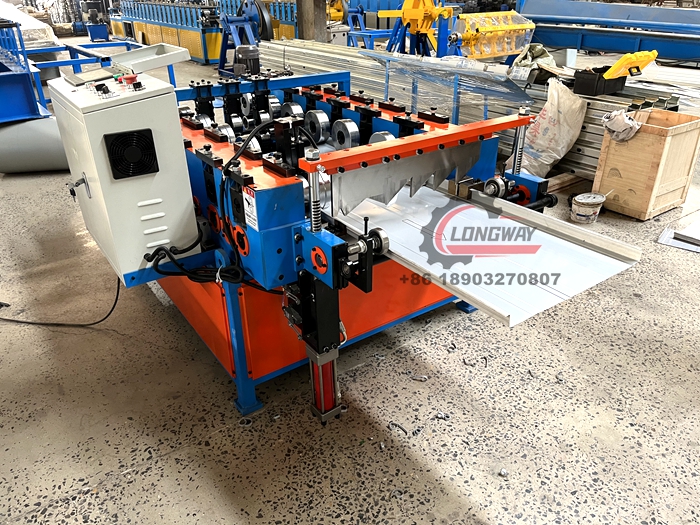roll forming machine for roofing sheet
Roll Forming Machines for Roofing Sheets A Comprehensive Overview
Roll forming is a modern manufacturing process that involves the continuous bending of a long strip of sheet metal into a desired shape. This process is particularly well-suited for roofing sheets, which require precise dimensions, durability, and aesthetic appeal. In this article, we will delve into the essentials of roll forming machines used in the production of roofing sheets, their benefits, key features, and applications.
What is a Roll Forming Machine?
A roll forming machine is a specialized piece of equipment that shapes flat metal sheets into desired cross-sectional profiles. The process typically involves feeding metal sheets through a series of rollers that gradually bend the sheet into the final shape. Roll forming machines are widely used in various industries, including construction, automotive, and rail, thanks to their efficiency, accuracy, and ability to produce lightweight yet strong products.
Structure and Components
A standard roll forming line for roofing sheets comprises several key components
1. Uncoiler This is the starting point of the roll forming process. The uncoiler holds the metal coil and unwinds it for feeding into the roll forming machine.
2. Leveling Device Before the metal sheet is formed, it must be leveled to ensure a consistent thickness and flatness. The leveling device plays a crucial role in this part of the process.
3. Roll Forming Stations These are the heart of the machine, consisting of multiple rollers that shape the metal sheet into the desired profile. Each station makes a small adjustment to the sheet, allowing for smooth and gradual bending.
4. Cutting Mechanism After the metal sheet reaches the end of the forming stations, it is cut to the required length. This can be done either manually or automatically, depending on the sophistication of the machine.
5. Stacker Once the roofing sheets are cut to size, the stacker collects and organizes them for easy handling and transportation.
Advantages of Roll Forming for Roofing Sheets
1. High Production Efficiency Roll forming machines can operate continuously, producing large quantities of roofing sheets in a relatively short amount of time. This efficiency is a significant advantage for manufacturers looking to meet high demand.
roll forming machine for roofing sheet

2. Precision and Consistency The automated nature of roll forming ensures that each sheet produced maintains the same specifications, reducing material waste and minimizing discrepancies in quality.
3. Versatility Roll forming machines can produce various profiles and shapes for roofing sheets, including standing seam and corrugated designs. This versatility allows manufacturers to cater to diverse customer needs.
4. Material Utilization Roll forming is known for its ability to use materials efficiently. The process minimizes scrap and waste, leading to cost savings and reduced environmental impact.
5. Durability The end products of the roll forming process are strong and durable, making them suitable for various roofing applications. The continuous nature of the rolled metal enhances structural integrity.
Applications of Roll Formed Roofing Sheets
Roll formed roofing sheets find applications in numerous sectors, including
- Residential Construction Lightweight and aesthetically pleasing roofing sheets enhance the overall look of homes while providing excellent protection against the elements.
- Commercial Buildings Many commercial structures utilize roll formed roofing sheets for their durability and low maintenance requirements.
- Industrial Facilities Warehouses and factories often prefer roll formed sheets for roofing due to their robustness and ability to withstand harsh environmental conditions.
- Agricultural Buildings Many agricultural structures, including barns and storage facilities, benefit from the flexibility and strength of roll formed roofing sheets.
Conclusion
As the construction industry continues to evolve, roll forming machines for roofing sheets offer a reliable and efficient solution for manufacturers. With their ability to produce high-quality, durable, and consistent products, these machines are integral to modern roofing applications. The advantages of roll forming, combined with advancements in technology, are paving the way for more sustainable and efficient manufacturing processes in the roofing sector. Whether for residential homes, commercial buildings, or industrial facilities, roll formed roofing sheets stand out as a preferred choice for builders and architects alike.
-
Roof Panel Machines: Buying Guide, Types, and PricingNewsJul.04, 2025
-
Purlin Machines: Types, Features, and Pricing GuideNewsJul.04, 2025
-
Metal Embossing Machines: Types, Applications, and Buying GuideNewsJul.04, 2025
-
Gutter Machines: Features, Types, and Cost BreakdownNewsJul.04, 2025
-
Cut to Length Line: Overview, Equipment, and Buying GuideNewsJul.04, 2025
-
Auto Stacker: Features, Applications, and Cost BreakdownNewsJul.04, 2025
-
Top Drywall Profile Machine Models for SaleNewsJun.05, 2025








